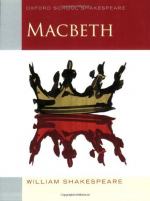|
This section contains 272 words (approx. 1 page at 400 words per page) |

|
Macbeth Summary & Study Guide Description
Macbeth Summary & Study Guide includes comprehensive information and analysis to help you understand the book. This study guide contains the following sections:
This detailed literature summary also contains Further Study and a Free Quiz on Macbeth by William Shakespeare.
At about 2100 lines, Macbeth is Shakespeare's shortest tragedy and among the briefest of his plays. Scholars generally agree that the drama was written around 1606 because various references in the play correspond to events which occurred in that year. Many also believe that it was composed for a performance before King James I, who had a deep interest in witchcraft. Quite possibly the play was one of the court entertainments offered to King Christian IV of Denmark during his visit to London in 1606. In addition. researchers suggest that Shakespeare may have written Macbeth to glorify King James's ancestry by associating him, through the historical Banquo, to the first Scottish king, Kenneth MacAlpin. The principal literary source for Macbeth is Raphael Holinshed's Chronicles of England, Scotlande, and Irelande (1577). However, Shakespeare took great liberties with this source, adapting various historical events to increase the dramatic effect ofhis tragedy. Considerable debate exists regarding the tragic context of Macbeth's downfall. In drama, a tragedy tradition ally recounts the significant events or actions in a protagonist's life which, taken tOgether, bring about the catastrophe. Classical rules of tragedy also require that the hero's ruin evokes pity and fear in the audience. Some critics assert that since Macbeth's actions throughout the play are inher ently evil, he gets what he deserves in the end and therefore his downfall is not catastrophic in a tragic sense. Other commentators, however, argue that although Macbeth embraces evil, his feelings of guilt, combined with the coercion of the witches and his wife, generate pity and fear among readers and spectators at his ruin, a feeling identified in classical tragedy as catharsis.
Read more from the Study Guide
|
This section contains 272 words (approx. 1 page at 400 words per page) |

|



